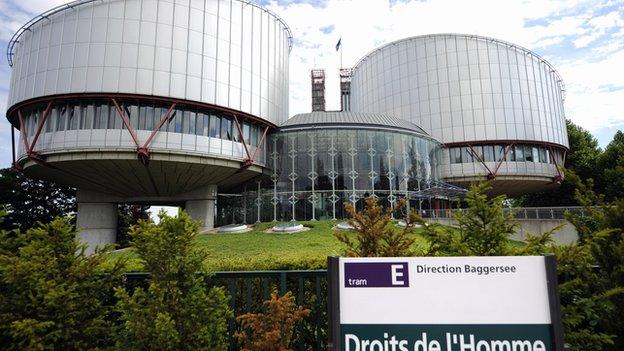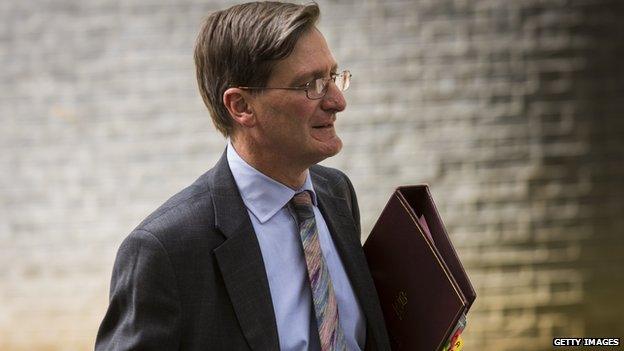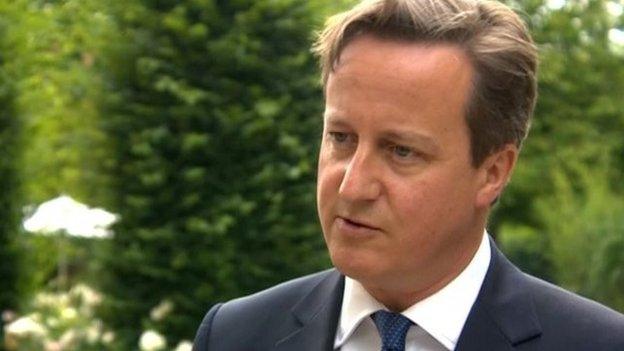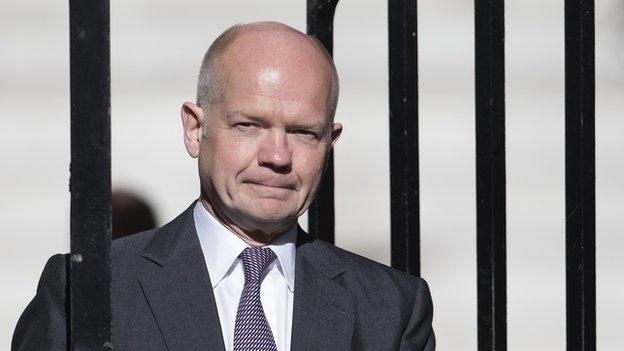Cameron sets his sights on human rights court
- Published

The European Court of Human Rights is based in Strasbourg
Who will rid me of this troublesome court?
That's the question David Cameron badly wants an answer to before the next election.
He needs it to woo back voters who think his government has proved impotent to resist the right of prisoners to vote or the right of foreign criminals to a family life here, or the right of suspected terrorists to fight deportation.
Election promise
The long and expensive struggle to deport Abu Qatada convinced the prime minister he should not just promise to repeal the Human Rights Act but should go further and confront the European Court of Human Rights in Strasbourg.
He wants to be able to make an election promise that Parliament, not foreign judges, should make these sorts of decisions.
There's just one problem - that's very easy to say yet mighty tricky to do... as the man who was the government's senior legal adviser until just a few days ago had a habit of saying.

Dominic Grieve was sacked as Attorney General
This is what Dominic Grieve told a Parliamentary committee before he was sacked as Attorney General in the reshuffle.
"It seems to me that one has to think very carefully about what the consequences are in deciding that you can cherry-pick the obligations that you are going to accept.
"Whilst it may be perfectly possible to disregard them you are creating a degree of anarchy in the international order that you are trying to promote"
'Car crash'
Put rather more crudely than Grieve might wish, he was warning that if Britain meddled with human rights laws there'd be nothing to stop President Putin and other less scrupulous figures doing the same.
In recent weeks the prime minister was presented with a plan by a group of Conservative lawyers. It proposes a new law which would assert that Parliament and not the European Court of Human Rights was the supreme body.
Their report predicts that a so-called British Bill of Rights would either force changes in the way the Strasbourg court works or trigger a crisis which could lead to the UK's expulsion from the international body which set up the court and which Britain helped to found - the Council of Europe.
The former Attorney General's reaction to that was stark. I'm told he warned his colleagues that it was a plan for "a legal car crash" albeit one with "a built-in time delay".
He argued that promising to stay in the European Convention of Human Rights whilst refusing to recognise the court's rulings was "incoherent".
Mr Grieve was not the only Tory minister who used to resist colleagues who fuelled headlines about human rights gone mad.

David Cameron wants to confront the human rights court before the election
You may recall how three years ago the then justice secretary condemned the home secretary after she delivered a party conference crowd pleaser about how a cat had stopped a man from being deported.
"Nonsense" was how Ken Clarke described that.
He, you may have noticed, like Dominic Grieve, also left the government this week.
There was, I'm told, one other voice who raised doubts about the plan for confronting the Strasbourg court in recent weeks.
It was that of the foreign secretary or rather the now ex-Foreign Secretary William Hague.
The obstacles to the plan David Cameron wants to unveil all seem to have been removed.
Update 10:00 BST
Downing Street reject any suggestion that the purpose of the reshuffle was to clear the decks for an assault on the European Court of Human Rights and say that no final decision has been taken on what will be in the Tory manifesto.
It's certainly true that William Hague chose to give up the Foreign Secretary's job for his own personal reasons but it is interesting to note that the promotion of human rights is something he put at the heart of the Government's foreign policy saying "there will be no downgrading of human rights under this government", external.
Ken Clarke also retired saying that at the age of 74 it was time he did other things but he also said he would have stayed on if asked. He wasn't.
Dominic Grieve did not expect to be asked to stand down as Attorney General and some Tory MPs have noted that his replacement, Jeremy Wright, is a much more junior and less experienced lawyer than Grieve and other possible candidates to replace him such as the Tory MP Stephen Phillips who I hear was very angry to be overlooked. (I don't claim to know what either man's views on the ECHR are. Do tweet me if you do)
So, it is clear that at least a side effect of the reshuffle is the removal of men who would have fought a plan the PM wants to make the centre-piece of his efforts to woo back UKIP voters.
- Published15 July 2014

- Published14 July 2014
